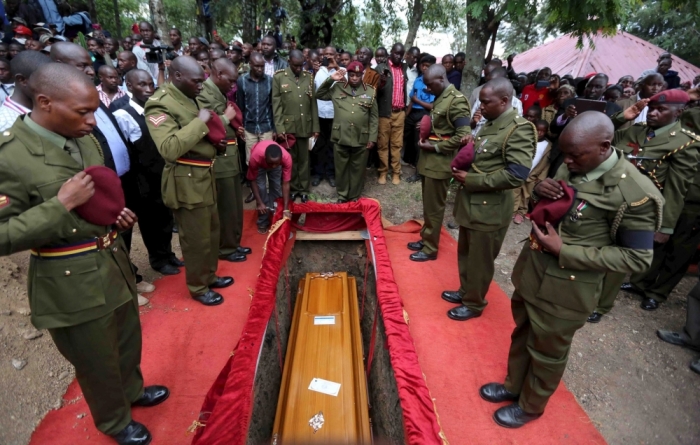Kenyan Official Denies Causing Delay in Police Response to Al-Shabaab's Attack on Garissa

A high police official has denied the allegation that the use of a police plane for a personal errand caused the commandos to respond 12 hours after the Somali terror group al-Shabaab began their attack at Kenya's Garissa University College earlier this month, which killed nearly 150 students, mostly Christian.
Kenya Police Airwing Commander Rodgers Mbithi has told police investigators that his decision to allow his daughter-in- law and her children to be flown from Mombasa to Nairobi did not delay the movement of the Recce Company commando unit from Nairobi to Garissa, according to The Associated Press.
Mbithi stated he is legally allowed to ask his pilots to pick up and fly his relatives and civilians. He added that the air wing has only two planes and one small helicopter. The helicopter had taken a police commander to northern Kenya, and the other plane had gone to Mombasa for a training exercise.
The attack by four al-Shabaab terrorists began at around 5.30 a.m. local time on April 2. And by the time the flight carrying the official's relatives departed Nairobi's Wilson Airport at 7.26 a.m., the commando unit had not been informed of any need to fly to Garissa, the official said.
A police commando earlier told CNN that the response team was ordered to assemble for a mission to Garissa at 7 a.m., and at 8 a.m., the team was informed that no police aircraft was available to take them. One team of commandos finally departed around 12:30 p.m., followed by another about 30 minutes later.
After they arrived in Garissa, the commandos took about two-and-a-half hours to just rehearse the assault on the university compound, according to the commando source. The police assault began around 5 p.m., and in about 15 minutes, one commando and all four terrorists were killed.
Another source told CNN that almost all the victims had been killed by the time commandos began their assault.
Al-Shabaab attacked the students to retaliate against Kenya's troops fighting its militants in Somalia. Kenya's troops have been in Somalia, which shares a long border with Kenya, since 2011.
The attack was the deadliest terror strike on Kenya since 1998 when 200 people died after the U.S. Embassy was bombed in Nairobi.
Meanwhile, the Kenyan government has launched airstrikes against alleged al-Shabaab training camps in Somalia, asked more than 350,000 Somalis in a refugee camp in Kenya to leave, and shut down Kenyan businesses accused of having links with al-Shabaab, all since the Garissa attack.
Rights groups have been accusing the Kenyan government of taking advantage of the terror threat as an excuse for its heavy-handedness since even before the Garissa attack. They say the government targets civil society, curbs civil freedoms and carries out extra-judicial killings and abductions. These actions may help terror groups to radicalize and recruit local people, they have warned.
However, the government refutes the allegations.
"You have to manage the politics and you have to manage the security, and find that balance," The Christian Science Monitor quoted Mwenda Njoka, spokesman for the Kenyan Interior Ministry, as saying. "But at the end of the day, security is more important, and following something like the massacre in Garissa, it becomes very difficult for the government not to take drastic action. On this one, it had to be done."
Surprisingly, even the National Council of Churches of Kenya is supporting the government's approach to the terror threat.
"If you are hit on one cheek, turn the other cheek," Rev. Canon Peter Karanja, the council's general secretary, was quoted as saying. "If you are hit on the other cheek, it didn't say what you do next, but there are only two cheeks that you can turn. The Christian leaders would like to tell the Muslim leaders, and the government, that there are no more cheeks to turn."




























